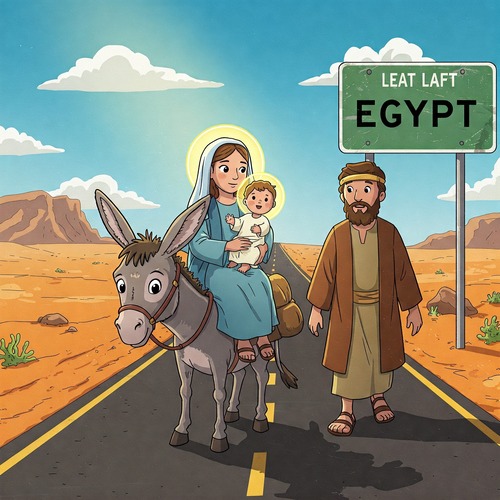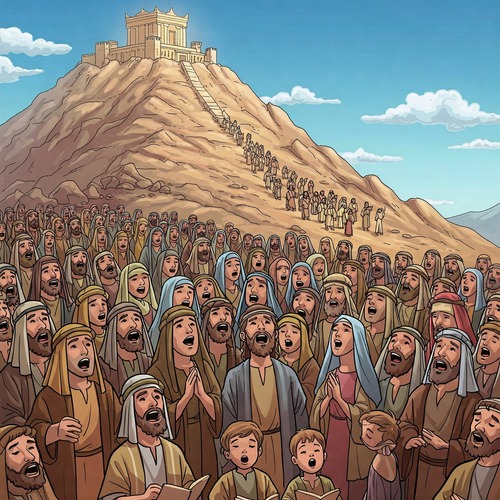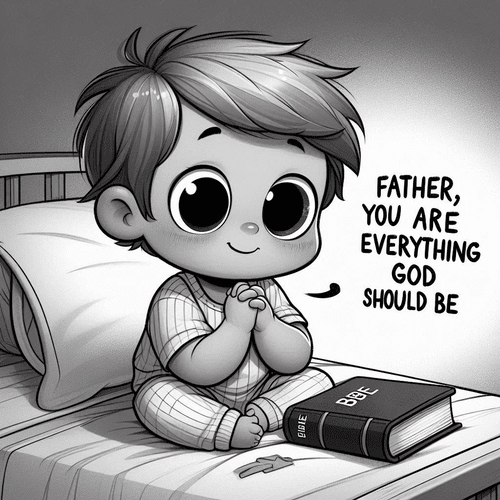Is Biblical Monotheism a Myth? Answering Modern Challenges
The belief that there is one God—and only one—has been Christianity’s bedrock conviction for two millennia. Yet today, some scholars argue biblical monotheism is actually a late invention, that ancient Israel originally worshipped many gods, and that monotheism was gradually imposed on earlier polytheistic texts. If true, this would undermine not just our understanding of the Old Testament, but the very foundation of Christian faith.
Are these claims credible? Is the Bible’s monotheistic message genuine, or have we been reading later theology back into ancient texts? The stakes couldn’t be higher.
THE CHALLENGE TO BIBLICAL MONOTHEISM
Modern critical scholarship often presents what’s called the “evolutionary theory” of Israelite religion: that Israel progressed from polytheism (many gods) through henotheism (one god among many) to finally arrive at monotheism (one God alone). Scholars point to several supposed evidences:
The plural term “Elohim” suggests multiple deities, they argue. References to “other gods” throughout Scripture allegedly acknowledge these gods’ reality. Others argue archaeological findings of Israelite religious artefacts prove widespread polytheistic practice. Comparative mythology shows similarities between Israelite and pagan religious concepts.
The underlying assumption? That we can’t trust the Bible’s own claims about Israel’s faith. Instead, we must reconstruct what “really happened” using modern historical-critical methods.
IS BIBLICAL MONOTHEISM A MYTH? LET SCRIPTURE SPEAK
Reformed theology offers a fundamentally different approach. We believe Scripture interprets Scripture, that unclear passages must be understood in light of clear ones, and that God’s revelation is both trustworthy and comprehensible. Rather than imposing evolutionary theories on the text, we let the Bible tell its own story.
THE BIBLICAL EVIDENCE FOR MONOTHEISM
Clear, Foundational Declarations: The Bible’s monotheistic message couldn’t be clearer. From Genesis 1:1—“In the beginning God created the heavens and the earth”—we see one God acting with unified purpose. The Shema declares: “Hear, O Israel: The LORD our God, the LORD is one” (Deuteronomy 6:4). Isaiah 44:6 records God’s words: “I am the first and I am the last; besides me there is no god.” Paul affirms: “There is no God but one” (1 Corinthians 8:4).
These aren’t isolated verses but represent the consistent thread running through all of Scripture. One God creates, covenants, judges, and redeems. The biblical narrative makes no sense without this unified divine character.
Addressing the “Problem” Passages: What about the supposed evidence for polytheism? Each claim dissolves under careful examination:
- Elohim’s plural form represents what Hebrew scholars call a “plural of majesty”—expressing God’s greatness and fullness, not numerical plurality. Just as we might say “Your Majesty” to address one sovereign, Elohim emphasises God’s supreme dignity.
- References to “other gods” appear in contexts of condemnation and polemic. When Scripture mentions these gods, it’s to deny their reality and power, not acknowledge their existence. “All the gods of the peoples are idols, but the LORD made the heavens” (Psalm 96:5). The very fact that Israel is repeatedly warned against these false gods proves monotheism was the standard they were abandoning.
- Divine council passages (like Psalm 82) refer to angels or earthly rulers, not co-equal deities. The context always maintains God’s unique supremacy over all created beings.
HISTORY AND ARCHAEOLOGY RECONSIDERED
Archaeological evidence of Israelite religious artefacts doesn’t disprove biblical monotheism—it confirms it. The Bible never claims all Israelites faithfully followed God’s commands. Instead, it repeatedly describes their failure to do so. The prophets’ fierce condemnations of syncretism and idolatry actually prove monotheism was the official standard being violated.
When Jeremiah thunders against those who “burn incense to other gods” (Jeremiah 7:9), he’s not acknowledging these gods’ reality but condemning Israel’s apostasy from the one true God. The biblical narrative is brutally honest about Israel’s failures—which makes its consistent monotheistic teaching all the more remarkable.
WHY THIS MATTERS FOR CHRISTIAN FAITH
Biblical monotheism isn’t just an abstract theological concept. It has profound implications for Christian life and worship:
- Salvation depends on it. Only the one true God can save. If there were multiple gods, which one would we trust? The gospel’s power rests on the fact that the God who created all things is the same God who redeems in Christ.
- Worship requires it. Jesus declared, “You shall worship the Lord your God and him only shall you serve” (Matthew 4:10). Exclusive devotion makes sense only if there’s one exclusive God.
- Biblical authority demands it. If Scripture is wrong about God’s fundamental nature, how can we trust its other claims? The Bible’s reliability stands or falls together.
THE LIMITS OF CRITICAL METHODOLOGY
Modern challenges to biblical monotheism often stem from methodological assumptions rather than textual evidence. When scholars approach Scripture with evolutionary presuppositions—assuming religion must develop from primitive to sophisticated—they inevitably find what they’re looking for.
But what if the opposite is true? What if monotheism was revealed from the beginning, and polytheism represents a falling away from original truth? This fits both the biblical narrative and the archaeological evidence far better than evolutionary theories.
The radical nature of Israelite monotheism in its ancient context actually supports its divine origin. Surrounded by polytheistic cultures, Israel’s unwavering insistence on one God stands out as utterly unique. This isn’t the product of natural religious evolution but of supernatural revelation.
STANDING FIRM ON BIBLICAL TRUTH
The challenges to biblical monotheism may sound scholarly, but they rest on shaky foundations. When we approach Scripture with the respect it deserves—as God’s trustworthy revelation—its monotheistic message rings clear and consistent.
From Genesis to Revelation, we encounter one God who creates, covenants, judges, and redeems. This isn’t a late theological development but the heart of biblical faith. The God who spoke to Moses at the burning bush is the same God who speaks to us in Christ. He alone is God, and there is no other.
Rather than succumbing to speculative reconstructions that undermine biblical authority, we can confidently affirm what Scripture teaches: “The LORD our God, the LORD is one.” In a world of competing claims and conflicting voices, this ancient confession remains our unshakeable foundation.
The Bible’s monotheistic message isn’t a myth—it’s the truth that transforms lives, sustains faith, and offers hope to a world desperately seeking the one true God who alone can save.
IS BIBLICAL MONOTHEISM A MYTH? RELATED FAQs
Don McClellan and others claim “Yahweh” was originally just a local tribal deity among many Canaanite gods. How do we respond? This theory assumes Israel’s understanding of Yahweh developed naturally from polytheistic roots, but the biblical evidence points in the opposite direction. From the earliest texts, Yahweh is presented as the universal creator who chose Israel, not a tribal deity who evolved into monotheism. The name Yahweh itself means “I AM WHO I AM” (Exodus 3:14), emphasising eternal, self-existent being—hardly the profile of a local tribal god. Archaeological evidence shows Israel’s monotheistic worship was radically different from Canaanite polytheism from the beginning, not a gradual development from it.
- Scholars point to Psalm 82 where God stands in the “divine assembly” and judges “gods.” Doesn’t this prove polytheism? Psalm 82 is actually a powerful monotheistic text that uses metaphorical language to describe God’s judgement on corrupt earthly rulers. The Hebrew term “elohim” can refer to judges or rulers (as in Exodus 21:6), not just deity. The psalm’s climax makes this clear: these so-called “gods” will “die like men” (v. 7), proving they’re mortal humans, not divine beings. The text affirms God alone truly judges and rules, using irony to contrast false human authority with divine sovereignty.
- What about the “Queen of Heaven” worship mentioned in Jeremiah? Doesn’t this show monotheism was imposed on earlier polytheistic practice? Jeremiah’s condemnation of Queen of Heaven worship (Jeremiah 7:18; 44:17-25) actually proves the opposite—that monotheism was the original standard being violated. The prophet’s fierce opposition shows this practice was apostasy from established monotheistic faith, not evidence of original polytheism. The people’s defensive response reveals they knew they were abandoning their covenant obligations. If polytheism had been acceptable originally, why would the prophet condemn it so strongly?
Some scholars argue the prohibition against “other gods” in the Ten Commandments actually acknowledges their existence. How do we answer this? The commandment “You shall have no other gods before me” (Exodus 20:3) uses legal language that addresses the people’s temptations, not theological reality. Ancient law codes regularly prohibited actions against non-existent things to prevent their creation or adoption. The prohibition demonstrates God’s exclusive claim on Israel’s worship, not acknowledgment of other deities’ reality. The very next commandment against idolatry (v. 4) shows these “other gods” are human-made images, not actual divine beings.
- How do we respond to critics who claim biblical monotheism was influenced by Egyptian pharaoh Akhenaten’s earlier monotheistic reform? Akhenaten’s brief religious experiment (c. 1353-1336 BC) was neither truly monotheistic nor influential on Israel. Akhenaten promoted worship of Aten while still acknowledging other gods’ existence—this is henotheism, not monotheism. His reform was quickly reversed and had no lasting impact even in Egypt. More importantly, biblical monotheism differs fundamentally from Akhenaten’s solar worship, emphasising ethical demands and covenant relationship rather than mere sun worship. The differences far outweigh any superficial similarities.
- What about the biblical passages that seem to show God learning or changing his mind? Don’t these suggest a limited deity among others? Passages describing God’s “repentance” or “changing mind” (like Genesis 6:6) use anthropomorphic language to communicate divine responses to human actions in ways we can understand. These texts don’t indicate divine limitation but divine relationship—God responds to human choices within his eternal, unchanging purpose. Numbers 23:19 explicitly states that “God is not man, that he should lie, or a son of man, that he should change his mind.” Scripture uses human language to describe divine actions without compromising God’s absolute sovereignty and uniqueness.
Scholars argue Israel’s monotheism only emerged during the Babylonian exile as a response to theological crisis. How do we refute this late-dating theory? This theory contradicts the biblical text itself, which presents monotheism as foundational from Moses onward, centuries before the exile. The pre-exilic prophets’ constant battles against syncretism actually prove monotheism was the established standard being violated, not a new development. If monotheism were a late innovation, why would the prophets condemn practices that supposedly reflected original Israelite religion? The exile confirmed monotheistic faith rather than created it—Israel’s God proved faithful while foreign gods proved powerless to save their worshippers from judgement.
IS BIBLICAL MONOTHEISM A MYTH? OUR RELATED POSTS
Editor’s Pick

‘Out of Egypt I Called My Son’: Did Matthew Misuse Hosea 11:1?
When Matthew quotes Hosea 11:1 in his Gospel—“Out of Egypt I called my son”—he draws a connection that has puzzled [...]

Bible Allusions: How They Enrich Our Grasp of God’s Word
Ever experienced that moment when you're reading Scripture and suddenly recognise an echo of another passage? That spark of recognition [...]

Old Testament Theophanies: What Purposes Did They Serve?
Throughout the Old Testament, we encounter remarkable moments when God manifests Himself in visible, often tangible forms to His people. [...]

When Words Fail: How the Holy Spirit Helps Us in Our Prayers
Ever sat down to pray and found yourself at a complete loss for words? Or perhaps you’ve prayed diligently but [...]

Isaiah 64:6: How Are Our Righteous Deeds Like Filthy Rags?
“We have all become like one who is unclean, and all our righteous deeds are like a polluted garment.” — [...]

The Greatest Yet the Least: How Is John the Baptist Both?
In Matthew 11:11, Jesus makes a statement that has puzzled Bible readers: “Truly I tell you, among those born of [...]

The Pilgrim’s Progress: Journeying Through the Psalms of Ascent
The Psalms of Ascent (Psalms 120-134) are a remarkable collection of fifteen songs that have guided God's people for millennia. [...]

Not Home Yet: How Scripture’s Exile Theme Shapes Our Faith
When we read Scripture carefully, a striking pattern emerges: God’s people are almost always on the move, displaced, or living [...]

At Pentecost: God Fulfils Covenant and Reverses Babel
The scene is electrifying. Jerusalem, crowded with Jewish pilgrims from across the known world. A sound like rushing wind fills [...]

The Sun’s Age: Is It Really A Showstopper for A Young Earth?
When discussing creation and the age of the earth, sceptics often point to the sun as definitive evidence against the [...]





